|
|
|
Sort Order |
|
|
|
Items / Page
|
|
|
|
|
|
|
| Srl | Item |
| 1 |
ID:
086199
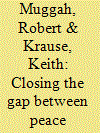

|
|
|
|
|
| Publication |
2009.
|
| Summary/Abstract |
This article highlights how the instruments for addressing the presumed source(s) of armed violence need to be sharpened and extended to address the heterogeneous character of armed violence present in many post-conflict situations. These extensions require the development of practical armed violence prevention and reduction programmes that draw upon scholarship and practice from the criminal justice and public health sectors. The article argues that reducing organized violence and insecurity in post-conflict contexts requires responding to the wider dynamics of armed violence rather than focusing exclusively on insecurity directly connected to what are traditionally defined as armed conflict and post-conflict dynamics; and this requires attention not just to the instruments of violence, but also to the political and economic motives of agents and institutions implicated in violent exchanges at all levels of social interaction.
|
|
|
|
|
|
|
|
|
|
|
|
|
|
|
|
| 2 |
ID:
086201
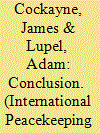

|
|
|
|
|
| Publication |
2009.
|
| Summary/Abstract |
This conclusion reviews the Special Issue's perspective on organized crime as both potential 'enemy' and 'ally' of peace processes. The social and economic power wielded by organized crime is highlighted, pointing to the role that peace operations play as an intervening variable between individuals/communities and the environments in which they operate. Peace operations use a range of tactics, from coercion to co-option, working with or against organized crime. However, these tactics will only be successful if they are framed within a coherent strategy, which may pursue either containment or transformation - or seek to combine them - through a phased transitional strategy. Peace operations should be a key component in a broad strategy of intelligent international law enforcement.
|
|
|
|
|
|
|
|
|
|
|
|
|
|
|
|
| 3 |
ID:
086192
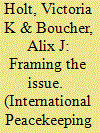

|
|
|
|
|
| Publication |
2009.
|
| Summary/Abstract |
This article examines the links between peace operations and combating transnational organized crime. It argues that while UN Security Council mandates direct UN missions to support establishing the rule of law in states that host peace operations, their role in addressing organized crime is more implicit than explicit. This article notes, however, that UN panels of experts, small fact-finding teams appointed to monitor targeted sanctions, may offer insight into, and options for addressing, such criminal networks. Panel findings and recommendations, however, are not integrated with related UN efforts to build the rule of law. This lack of integration reflects a need, on the part of the UN and its member states, to address better the ability of peace operations, UN panels of experts, and other tools for peacebuilding to contribute more effectively to fighting spoiler networks and organized crime.
|
|
|
|
|
|
|
|
|
|
|
|
|
|
|
|
| 4 |
ID:
086189
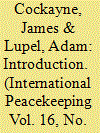

|
|
|
|
|
| Publication |
2009.
|
| Summary/Abstract |
Peace operations are increasingly on the front line in the international community's fight against organized crime. In venues as diverse as Afghanistan, the Balkans, Haiti, Iraq and West Africa, multiple international interventions have struggled with a variety of protection rackets, corruption and trafficking in a wide range of licit and illicit commodities: guns, drugs, oil, cars, diamonds, timber - and human beings. This introduction to the Special Issue on peace operations and organized crime discusses the concept of 'organized crime' as a label, and suggests ways of differentiating organized crime groups on the basis of their social governance roles, resources and strategies towards authority structures - such as peace operations.
|
|
|
|
|
|
|
|
|
|
|
|
|
|
|
|
| 5 |
ID:
086198
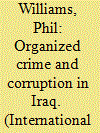

|
|
|
|
|
| Publication |
2009.
|
| Summary/Abstract |
This article seeks to put organized crime in Iraq in a broad comparative perspective. It examines the evolution of organized crime in Iraq, from a largely state-controlled phenomenon under Saddam Hussein to a free market in criminality under the current regime, and identifies the factors which led to this transformation. It also delineates the most prevalent and lucrative criminal activities and identifies those groups and factions involved. It argues that organized crime activities have become the funding mechanism of choice, as well as a means to consolidate local control, for most of the actors engaged in violence in Iraq. The analysis also suggests that a struggle for control over resources related to criminal activities has itself helped to foment violence among certain groups. Consequently, combating organized crime must be central to the US mission in Iraq. The focus should be principally on criminal activities that contribute most to the insecurity of the Iraqi people. The analysis concludes by considering ways in which the power of criminal organizations can be diminished and the consequences of criminal activities mitigated.
|
|
|
|
|
|
|
|
|
|
|
|
|
|
|
|
| 6 |
ID:
086195


|
|
|
|
|
| Publication |
2009.
|
| Summary/Abstract |
This article describes the relationship between organized criminal networks and the peace process in Guatemala, the growth of illicit groups after the signing of the accords, and the response of UN and other international actors to that growth. It argues that both the UN and donors demonstrated a mixed, but ultimately very limited, ability to influence Guatemalan policy and institutional efforts to combat organized crime and illicit groups. Nevertheless, the Guatemala experience reveals several areas where the UN might help states to combat the emergence of political-criminal structures where it has deployed a peace operation or offered its good offices to help a state avoid threats to peace and stability.
|
|
|
|
|
|
|
|
|
|
|
|
|
|
|
|
| 7 |
ID:
086197
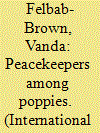

|
|
|
|
|
| Publication |
2009.
|
| Summary/Abstract |
This article analyses the role that the illicit narcotics economy has played in violent conflict in Afghanistan since the 1990s and the relationship between counter-narcotics and counter-insurgency policy in the country today. It details the evolution of the peacekeeping mission vis- -vis the narcotics economy, and the effects to date of the counter-narcotics policies that have been adopted since 2001. It argues that aggressive opium poppy eradication in Afghanistan today is premature and counterproductive with respect to counter-insurgency and stability objectives, as well as with respect to long-term economic development goals. The article concludes by providing policy recommendations on the role of peacekeeping forces with respect to illicit economies, arguing that the most important role peacekeeping forces have in tackling crime and reducing illicit economies is to provide security.
|
|
|
|
|
|
|
|
|
|
|
|
|
|
|
|
| 8 |
ID:
086193


|
|
|
|
|
| Publication |
2009.
|
| Summary/Abstract |
The illicit business side of armed conflict can involve clandestine exports to fund combatants, reselling looted goods on the black market, smuggling weapons and other supplies, sanctions evasion and embargo busting, theft and diversion of humanitarian aid, and covert 'trading with the enemy'. How does such illicit business affect peace operations in conflict zones, and how do such peace operations, in turn, affect illicit business? This article provides a preliminary answer in the case of the 1992-95 war in Bosnia-Herzegovina. Instead of reinforcing the common tendency simply to ignore or condemn the illicit business side of conflict and its relationship to peace operations, it stresses the more ambiguous and double-edged nature of the issue. Peace operations in Bosnia contributed to illicit business activities, but in some respects illicit business also contributed to a number of peace operation goals - including helping to sustain the civilian population and even bringing an end to the conflict. The end result was actually more of a symbiotic rather than exclusively predatory relationship between peace operations and illicit business activities.
|
|
|
|
|
|
|
|
|
|
|
|
|
|
|
|
| 9 |
ID:
086194
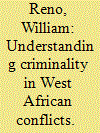

|
|
|
|
|
| Publication |
2009.
|
| Summary/Abstract |
Most standard analyses and policies aimed at peacekeeping and post-conflict reconstruction in West Africa understand members of armed groups, and especially their leaders who engaged in illicit commerce, as criminals. This analysis and the policies that follow from it miss the extent to which these transactions now contribute to the construction of new political relationships and are seen by those who participate in them as one of the few avenues for active participation in the post-war economy and politics. This article explains how illicit commerce underlies new political relationships in West Africa. It shows how measures to disrupt these transactions can destabilize politics. But often those who participate in illicit markets prove able to manipulate externally imposed measures and assert their own interests.
|
|
|
|
|
|
|
|
|
|
|
|
|
|
|
|
| 10 |
ID:
086196
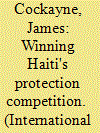

|
|
|
|
|
| Publication |
2009.
|
| Summary/Abstract |
This article draws lessons from the experiences of international involvement in Haiti from 1990 to the present day. It argues that if the model of liberal, responsible government championed by the international community is to provide a resolution to the ongoing violence and instability in Haiti, then Haitian society will first have to be wooed away from coercive 'protection' by local and transnational organized crime. However, it argues that peace operations as they are currently conceived and deployed are ill-equipped for this task, given their limited territorial ambit and traditional focus on military response rather than political economy. However, the article concludes that experiences in Haiti may also offer lessons about how peace operations could win 'protection competitions' by serving as the leading edge of a unified international strategy for the transformation of local political economies.
|
|
|
|
|
|
|
|
|
|
|
|
|
|
|
|
|
|
|
|
|